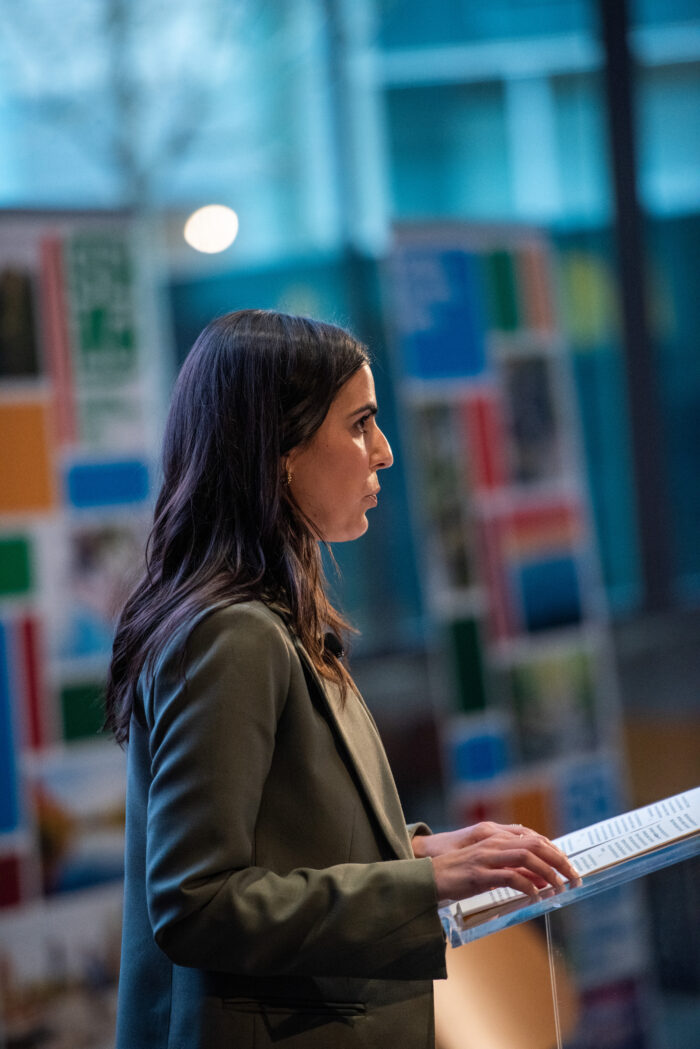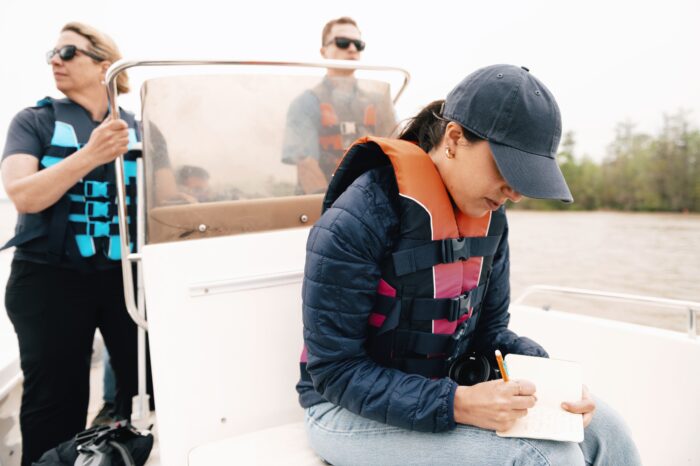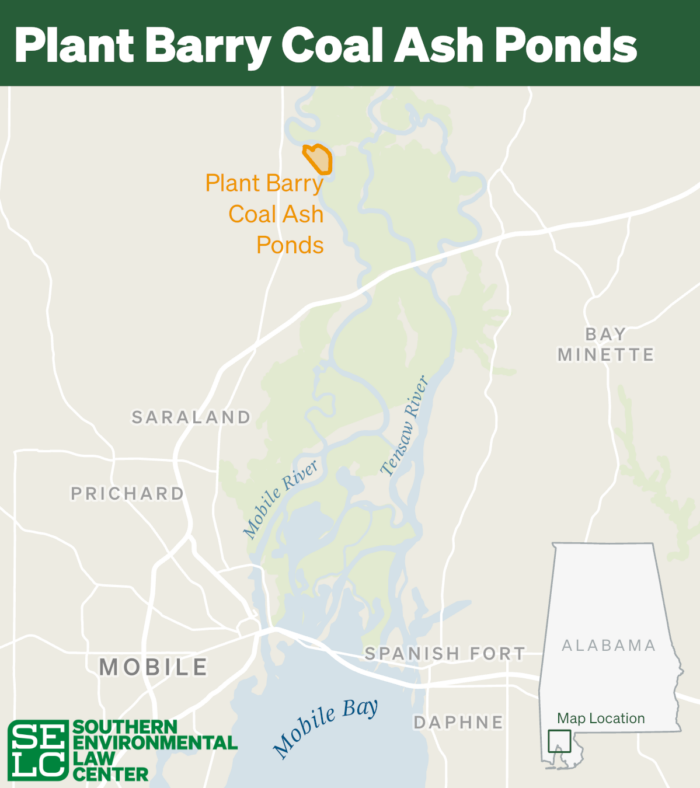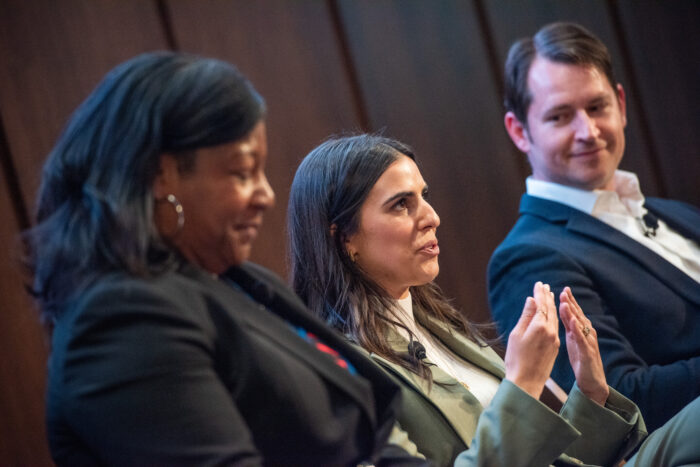Earth Month dialogues: Journalist Isabelle Chapman takes on coal ash
The transition from coal-fired power plants to cleaner, more renewable sources is revolutionizing how we make energy across the country, but the dirty legacy of coal lives on — in this case, in the form of highly toxic coal ash pollution and a looming public health disaster.
So how did coal ash pollution in the Mobile-Tensaw Delta get on the radar of Chicago-area native and CNN Investigates Producer Isabelle Chapman?

“I like to tell stories about environmental risks that exist in our backyards, how to limit these risks, and who has to clean up the mess that’s inevitably left behind,” she said last month at SELC’s 2023 Reed Environmental Writing Award Ceremony in Charlottsville, Virginia. Chapman was in town to accept the journalism award for her exemplary reporting on Alabama Power’s plans to bury a heap of toxic coal waste in the delta, one of North America’s most biodiverse river systems.
In “Gambling ‘America’s Amazon,’” she exposes the dangers of coal ash and how utility companies like Alabama Power have been careless with the substance, keeping it in unlined pits, for decades.
Coal ash is often stored on fragile waterways or in areas where communities and their drinking water sources are at risk of contamination from the pollution. Her piece focuses Plant Barry’s surrounding river system, a biodiversity hot spot with wildlife and plants found nowhere else on Earth, and the communities located in the danger zone if the coal ash were to spill.
As a producer for CNN Investigates, Chapman has reported on important national stories, including reproductive health, criminal justice, and how America deals with its waste. We asked about her experience writing the Reed Award-winning story, what more people need to know about coal ash pollution, and how she views her role as a journalist in getting the public engaged on pressing issues.

What draws you to cover environmental stories?
When it comes to talking about protecting our planet, there are environmental stories and then there’s climate change. Reporting on climate change is a harder nut to crack because it’s much more abstract and can feel so insurmountable. But environmental reporting is much easier to grasp. There’s often a bad actor that you can examine — and I’ve found it’s often a big corporation that should be held accountable. Being outside is a transformative experience for everybody and we should be preserving these places so people can continue to enjoy them.
“Gambling ‘America’s Amazon’” published in December 2021, so you’ve had some time to reflect. What has stuck with you most?

The people who shared their stories. I had been to Alabama for vacation, but never to the Mobile-Tensaw Delta. I spent about a week there and got to talk to so many people who didn’t make it into the piece. If you’re not from the area, you’ve probably never heard of the delta, and there are a lot of people who have devoted their time to protecting it. Those conversations always are what stay with me.
Will you share a favorite memory from your time in southern Alabama’s Mobile Tensaw-Delta?
It was a great reporting experience. It was April 2021, so we had all just come off of a year inside. Getting to leave my very small New York apartment to spend time in this incredible, natural, pristine wetland was just such a breath of fresh air. Just being on a boat, in a delta, and just feeling life rushing at you was just really special.
How do you view your role as a journalist in getting the public engaged on issues that affect our public health and environment?
Every investigative piece should have a dry data component that serves as the nut [paragraph] of your story. The job of the journalist is always to bring humanity to the topic and finding real people to tell the story in a compelling way. For this piece, we included vignettes of different characters talking about different issues, and we made it a very visual story because the delta is such a visual place. I thought this approach would help bring the issue to life since the effects of coal ash can be invisible.
I think my role as a journalist is connecting my audience with the people who have a story to tell, and delivering the information in a way that’s accessible, visual, and easy to understand.
I’m not a subject matter expert. I don’t know everything there is to know about coal ash, for example. But I think my role as a journalist is connecting my audience with the people who have a story to tell, and delivering the information in a way that’s accessible, visual, and easy to understand.
What do you wish more people knew about coal ash pollution?
Coal ash is one of the largest types of industrial waste in the United States. As we try to pivot from coal to cleaner sources of energy, the consequences remain, and coal ash is a prime example.
Do you have a background in reporting on environmental issues?

In reporting, everyone’s a little self-taught. I went to Columbia University and wrote a thesis on environmental issues in Brooklyn, but for the most part, environmental reporting is something I’ve learned slowly over time. It’s definitely a passion and one of the things I like to focus on.
What are you currently reading?
I Love You, But I’ve Chosen Darkness by Claire Vaye Watkins and Just Mercy by Bryan Stevenson.
What are you listening to?
I listen to NPR or The Daily most days. I also love The Rewatchables from The Ringer Podcast Network — it’s kind of a ‘dude’ podcast hosted by Bill Simmons, but I just love it.
